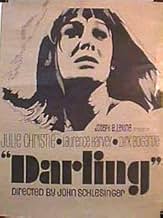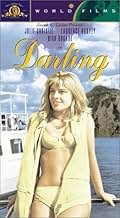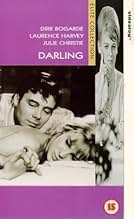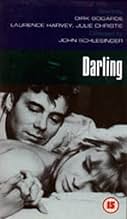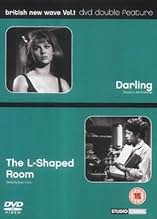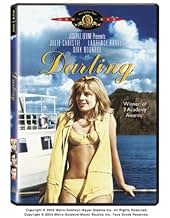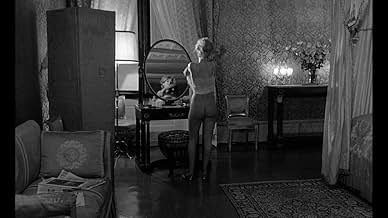IMDb RATING
7.0/10
8.4K
YOUR RATING
Beautiful but amoral model Diana Scott sleeps her way to the top of the London fashion scene at the height of the Swinging Sixties.Beautiful but amoral model Diana Scott sleeps her way to the top of the London fashion scene at the height of the Swinging Sixties.Beautiful but amoral model Diana Scott sleeps her way to the top of the London fashion scene at the height of the Swinging Sixties.
- Won 3 Oscars
- 17 wins & 8 nominations total
José Luis de Vilallonga
- Prince Cesare della Romita
- (as Jose Luis De Vilallonga)
T.R. Bowen
- Tony Bridges
- (as Trevor Bowen)
Featured reviews
Darling (1965)
A black and white, Mod London romance and its aftermath, over and over, with all the tumult and glitz of the times. The events race forward and create a real tornado of activity, centering around one woman, Diana Scott, who is perfectly played by Julie Christie. Diana is as charming and beautiful as the actress who plays her, and she is drawn to men, to the movies, to modeling, and generally to success and ruin, up and down, in a wild ride.
British movies had a vigorous neo-realism (British New Wave) movement in the late 50s and early 60s, and by the time of this film it had segued into a purely celebratory pop mode, cashing in on the times, and the British Invasion in music. "Darling" is kind of in both worlds, I think, the same way the 1964 "A Hard Days Night" is in both, though they are very different films. But there is a frankness to the filming that belies the (at first) entertaining and largely fictional subject. And unlike the earlier neo-real innovators ("Loneliness of a Long Distance Runner" etc.), the focus here is on a privileged class, and on the rising fortunes of Diana as she moves from one relationship to another.
The filming gives these seemingly flighty, alternately glib and sad events a somberness they need. Director John Schlesinger was a British New Wave upstart, and would later do the American masterpiece "Midnight Cowboy," which might be said to have the same mixture of inventive fiction and believable raw realism.
Diana is a superficial woman who cashes in on her good looks and fun temperament, and her many men never seem to mind at first. She leads, but she also get towed along, falling in love, never seeming to be quite as happy as she should. Indeed, the movie begins with her explaining through a voice-over her inner yearning for what matters in life, since it's so hard to otherwise tell. Toward the end, in Italy (after England and France had been exhausted), she says to her newest man, "If I could just feel complete." And she means it. But then, in the next scenes, she's having fun again, telling lies and losing her bearings.
Christie is a marvel, really, even though you might just say she's playing herself (though not acting out the events in her life, we hope). This is her breakout film (along with her next film, "Dr. Zhivago"), and she really does typify the Mod English girl, fresh and carefree. There is even a very brief nude shot, from behind, that is a sign of mid-60s liberation in both life and in filmmaking. Dirk Bogarde is certainly excellent, too, and subtle, and indeed the whole cast is first rate, maybe because everyone is playing their contemporary selves with fictional names.
So the movie is terrific, even if it sometimes seems to keep meandering through the paces over the whole two hours. It wraps you in its world. Inevitably the outcome is as somber as the greys of the filming. What else would happen to someone who can't find love, or happiness, or meaning? It's impossible to really feel complete, as a person, if you search outside yourself too much, and hers is a superficial world of her own making, Diana is a superficial woman with lots of unexplored depth.
The writing here is totally first rate, the filming is first rate, the editing and pace first rate. It's simply a well made movie about a contemporary dilemma. "Thank God it's never too late," she says at the end, and in fact you know that she should really say, "God, everything stays the same." I don't think there is meant to be an echo here of Grace Kelly in particular, but there is a similar arc to Diana's career (and her name, of course, predicts a later Princess Diana). Diana's apparent sexual freedom is laden with that old convention of marriage (which she early on wisely says she doesn't want) and so some extent she can be a freewheeling young woman partly because she is always taken care of, and increasingly so. An interesting take on whether this is an accurate picture at all of the times is in this short apolitical article: www.socialistreview.org.uk/article.php?articlenumber=10813.
This movie ranks, for me, almost up there with "Alfie" and "Georgie Girl" (two of my favorites) as a look at the times in England. Honest, sometimes disturbing, and artistically considered. Don't miss it.
A black and white, Mod London romance and its aftermath, over and over, with all the tumult and glitz of the times. The events race forward and create a real tornado of activity, centering around one woman, Diana Scott, who is perfectly played by Julie Christie. Diana is as charming and beautiful as the actress who plays her, and she is drawn to men, to the movies, to modeling, and generally to success and ruin, up and down, in a wild ride.
British movies had a vigorous neo-realism (British New Wave) movement in the late 50s and early 60s, and by the time of this film it had segued into a purely celebratory pop mode, cashing in on the times, and the British Invasion in music. "Darling" is kind of in both worlds, I think, the same way the 1964 "A Hard Days Night" is in both, though they are very different films. But there is a frankness to the filming that belies the (at first) entertaining and largely fictional subject. And unlike the earlier neo-real innovators ("Loneliness of a Long Distance Runner" etc.), the focus here is on a privileged class, and on the rising fortunes of Diana as she moves from one relationship to another.
The filming gives these seemingly flighty, alternately glib and sad events a somberness they need. Director John Schlesinger was a British New Wave upstart, and would later do the American masterpiece "Midnight Cowboy," which might be said to have the same mixture of inventive fiction and believable raw realism.
Diana is a superficial woman who cashes in on her good looks and fun temperament, and her many men never seem to mind at first. She leads, but she also get towed along, falling in love, never seeming to be quite as happy as she should. Indeed, the movie begins with her explaining through a voice-over her inner yearning for what matters in life, since it's so hard to otherwise tell. Toward the end, in Italy (after England and France had been exhausted), she says to her newest man, "If I could just feel complete." And she means it. But then, in the next scenes, she's having fun again, telling lies and losing her bearings.
Christie is a marvel, really, even though you might just say she's playing herself (though not acting out the events in her life, we hope). This is her breakout film (along with her next film, "Dr. Zhivago"), and she really does typify the Mod English girl, fresh and carefree. There is even a very brief nude shot, from behind, that is a sign of mid-60s liberation in both life and in filmmaking. Dirk Bogarde is certainly excellent, too, and subtle, and indeed the whole cast is first rate, maybe because everyone is playing their contemporary selves with fictional names.
So the movie is terrific, even if it sometimes seems to keep meandering through the paces over the whole two hours. It wraps you in its world. Inevitably the outcome is as somber as the greys of the filming. What else would happen to someone who can't find love, or happiness, or meaning? It's impossible to really feel complete, as a person, if you search outside yourself too much, and hers is a superficial world of her own making, Diana is a superficial woman with lots of unexplored depth.
The writing here is totally first rate, the filming is first rate, the editing and pace first rate. It's simply a well made movie about a contemporary dilemma. "Thank God it's never too late," she says at the end, and in fact you know that she should really say, "God, everything stays the same." I don't think there is meant to be an echo here of Grace Kelly in particular, but there is a similar arc to Diana's career (and her name, of course, predicts a later Princess Diana). Diana's apparent sexual freedom is laden with that old convention of marriage (which she early on wisely says she doesn't want) and so some extent she can be a freewheeling young woman partly because she is always taken care of, and increasingly so. An interesting take on whether this is an accurate picture at all of the times is in this short apolitical article: www.socialistreview.org.uk/article.php?articlenumber=10813.
This movie ranks, for me, almost up there with "Alfie" and "Georgie Girl" (two of my favorites) as a look at the times in England. Honest, sometimes disturbing, and artistically considered. Don't miss it.
What a delight. Possibly the best of the British New Wave and one of the finest British films of all time. The story follows Julie Christie's rise up the social ladder by a succession of affairs and social posturing she's infuriating, but you can't resent her behaviour, she is so natural and full of joie de vivre impossible to keep in a cage. She first appears walking along the street swinging her handbag the same entrance as she made in "Billy Liar" and surely an indication that we are dealing with essentially the same character. Bogarde, a television journalist, is the first man she takes up with, and is as serious as she is reckless, yet somehow they are well-suited and their relationship, with some painfully familiar ups and downs, is touching.
The emotional core of the film is Bogarde and Christie's visit to an old writer. This, her first step up the social ladder, gives her the thrill of being somewhere, doing something. It is also a gently melancholy and thoughtful scene. Humour and emotion come in equal measure throughout, and every exchange crackles with meaning:
Christie: "You used me!" Bogarde: "You used me. It's a moot point."
Christie really earned her Oscar for this. Her performance is full of humour and irony, but she's mainly being herself and she has a genuine sensitivity and humanity that lifts you and carries you along. Only some slightly flippant scenes with her photographer friend (especially the shoplifting scene which was too much like "Breakfast at Tiffanys") were a little out of alignment. But Schlesinger does special things throughout. Every scene is like a little self-contained story, so sharply done you can almost hear a snap at the beginning and end as it falls into place.
This is a big film, almost as big as "La Dolce Vita" which it sometimes echoes - better, perhaps, on account of the razor sharp script by Frederic Raphael which is so accomplished, smooth, intelligent, witty and ironic that it has an almost poetic quality while still being thoroughly down-to-earth. The ending is unexpectedly downbeat, and doesn't feel like the real end, just a line they had to draw somewhere - which is perhaps what the film really was all about: the lines that we have to draw at certain points in our lives that rule some things in, other things out, that enable us to go on, for better or worse. Really splendid stuff.
The emotional core of the film is Bogarde and Christie's visit to an old writer. This, her first step up the social ladder, gives her the thrill of being somewhere, doing something. It is also a gently melancholy and thoughtful scene. Humour and emotion come in equal measure throughout, and every exchange crackles with meaning:
Christie: "You used me!" Bogarde: "You used me. It's a moot point."
Christie really earned her Oscar for this. Her performance is full of humour and irony, but she's mainly being herself and she has a genuine sensitivity and humanity that lifts you and carries you along. Only some slightly flippant scenes with her photographer friend (especially the shoplifting scene which was too much like "Breakfast at Tiffanys") were a little out of alignment. But Schlesinger does special things throughout. Every scene is like a little self-contained story, so sharply done you can almost hear a snap at the beginning and end as it falls into place.
This is a big film, almost as big as "La Dolce Vita" which it sometimes echoes - better, perhaps, on account of the razor sharp script by Frederic Raphael which is so accomplished, smooth, intelligent, witty and ironic that it has an almost poetic quality while still being thoroughly down-to-earth. The ending is unexpectedly downbeat, and doesn't feel like the real end, just a line they had to draw somewhere - which is perhaps what the film really was all about: the lines that we have to draw at certain points in our lives that rule some things in, other things out, that enable us to go on, for better or worse. Really splendid stuff.
"Darling", as it happens with most genuine works of art, it grows, it develops over the years and acquires a sort of clarity that, with the benefit of hindsight I will dare to call it, prophetic, as a social observation of its time. But what matters most is the film as a film. Brilliantly thought, written, directed, photographed and, of course, acted. Julie Christie became a symbol. She, clearly a very intelligent woman, surfed the waves of fame with an apparent detachment that I'm sure it's a sure sign of maturity and of a great respect for her profession and herself. If you think I love Julie Christie, you're right. But my love for her has to do with "Darling" and the age I was when I first saw it. The 60's were already in the past then but I saw them in the future, an immediate future.I can't imagine anyone, from any age, who loves film could be indifferent to this tale of isolation in a world moving fast towards an acceptable cult for celebrity. Not to be missed.
Darling is known generally as an iconic "Sixties" movie. It is at once a product of its time and a still-born anachronism. Though conceived and shot in 1964-65, there is nary a hint of the Beatles and their ilk, who by the time this film went in front of the cameras were unquestionably the major pop cultural phenomenon on earth, and certainly in Britain where this story takes place. The characters who parade before us in this slickly packaged satire are far more evocative of the earlier "La Dolce Vita" period. Perhaps the newly emerging youthful counterculture is absent because the groupings visited here are, in contrast to the many- millioned teenage Beatles fans, older, more rarefied and further up the social ladder in corporate boardrooms, haute-couture industry gatherings, mainstream television production units, the profit-driven B-movie exploitation industry, and the haunts of continental royalty. Sparkling and memorable as it is, the musical scoring by John Dankworth was also dated by mid-1965 when this film came out.
The satire is often from the finger-pointing, underscoring school. Best example: A portly dowager in furs at a charity function stuffs an hors d'oeuvre into her mouth with a bejeweled hand as a speaker pompously thanks those present for fighting the scourge of hunger in the world.
Screenwriter Frederic Raphael and director John Schlesinger organize their material in semi- documentary fashion with voice-over narration by the title character, Diana Scott (Julie Christie) in order to reveal her hypocrisy as she describes various episodes in her life while the unfolding screen actions ironically contradict her words. She portrays herself verbally as innocent, sensible and basically decent when in fact she's selfish, dishonest and miserable. The underlying causes of her selfishness, dishonesty and misery are neither explained nor explored, but she is presented in a way that encourages us to regard her as a micro-consequence of the crass, materialistic, soulless macro-society around her. The episodes in her bumpy road to despair succeed one another briskly enough to keep us diverted and shaking our heads at the imperfect human types on display. The arc of the story takes Diana higher and higher on the material plane until she can rise no more, only to find emptiness at the top. The point seems to be "looks, money and prestige aren't everything – but look how entertainingly we're presenting that platitude."
This film and Doctor Zhivago, released shortly after, made Julie Christie the most honored and publicized actress in the world for about a year and it's interesting to compare her Diana Scott with her Lara character in David Lean's epic. Lean, a stern and experienced taskmaster, got more solid acting out of her. Schlesinger's grip is looser, resulting in a more uninhibited but less disciplined performance. As one flavor of the media-created "It" girls of the Sixties (Ann Margret, Twiggy, Goldie Hawn being other flavors) she embodied a certain attitude toward life that was in the air in the industrialized world in those days, an informality of demeanor which some would call proletarian or others would call "beatnik"; hers was a looser, more naturalistic look, a beauty outside the parlor. Julie Christie was beautiful without a speck of makeup while the wind was blowing her hair in four different directions and seemed to be an entirely different person depending on which angle she presented to the camera or what kind of light was bouncing off her partly chiseled, partly soft and sensuous features. Her very presence lent a depth that may not have been written into the character. With another actress, one can only wonder how effective this film would have been. Her chief fellow players, Laurence Harvey and Dirk Bogarde, give splendid support, as does the rest of the cast. But the spotlight is definitely on Julie; it is her showcase.
The satire is often from the finger-pointing, underscoring school. Best example: A portly dowager in furs at a charity function stuffs an hors d'oeuvre into her mouth with a bejeweled hand as a speaker pompously thanks those present for fighting the scourge of hunger in the world.
Screenwriter Frederic Raphael and director John Schlesinger organize their material in semi- documentary fashion with voice-over narration by the title character, Diana Scott (Julie Christie) in order to reveal her hypocrisy as she describes various episodes in her life while the unfolding screen actions ironically contradict her words. She portrays herself verbally as innocent, sensible and basically decent when in fact she's selfish, dishonest and miserable. The underlying causes of her selfishness, dishonesty and misery are neither explained nor explored, but she is presented in a way that encourages us to regard her as a micro-consequence of the crass, materialistic, soulless macro-society around her. The episodes in her bumpy road to despair succeed one another briskly enough to keep us diverted and shaking our heads at the imperfect human types on display. The arc of the story takes Diana higher and higher on the material plane until she can rise no more, only to find emptiness at the top. The point seems to be "looks, money and prestige aren't everything – but look how entertainingly we're presenting that platitude."
This film and Doctor Zhivago, released shortly after, made Julie Christie the most honored and publicized actress in the world for about a year and it's interesting to compare her Diana Scott with her Lara character in David Lean's epic. Lean, a stern and experienced taskmaster, got more solid acting out of her. Schlesinger's grip is looser, resulting in a more uninhibited but less disciplined performance. As one flavor of the media-created "It" girls of the Sixties (Ann Margret, Twiggy, Goldie Hawn being other flavors) she embodied a certain attitude toward life that was in the air in the industrialized world in those days, an informality of demeanor which some would call proletarian or others would call "beatnik"; hers was a looser, more naturalistic look, a beauty outside the parlor. Julie Christie was beautiful without a speck of makeup while the wind was blowing her hair in four different directions and seemed to be an entirely different person depending on which angle she presented to the camera or what kind of light was bouncing off her partly chiseled, partly soft and sensuous features. Her very presence lent a depth that may not have been written into the character. With another actress, one can only wonder how effective this film would have been. Her chief fellow players, Laurence Harvey and Dirk Bogarde, give splendid support, as does the rest of the cast. But the spotlight is definitely on Julie; it is her showcase.
To see this 60's landmark film is quite something. In many ways could be considered a period piece and at the same time it could have been conceived yesterday. Julie Christie's performance is the insurance "Darling" has to ensure its powerful sailing through the years into the forever ever. She is extraordinary! Schlesinger lets himself be guided by something other than his British restrain and fear of sentimentality here. He is tough and poetic telling us the story of Diana Scott (could had been Lady Diana Spencer to a T) with understanding and compassion but without trying to make her a sympathetic character. Julie Christie takes care of that in what, time will tell, in fact is already telling us, one of the best performances on film, ever.
Did you know
- TriviaThe "vox pop" TV interviews conducted by Dirk Bogarde's character with people in the street were all done with genuine members of the public, not actors, and were not scripted.
- GoofsWhen Diana and Robert quarrel and he leaves the apartment they share together, a microphone is visible on the left of the scene.
- Quotes
Diana Scott: Taxi!
Robert Gold: We're not taking a taxi.
Diana Scott: Why not?
Robert Gold: I don't take whores in taxis.
Diana Scott: What do mean?
Robert Gold: That's what you are isn't it? A little whore! Isn't it?
- Alternate versionsThe original UK cinema version was cut by the the BBFC to remove shots of a man wearing a woman's corset and to heavily shorten a scene at a party in Paris where guests watch a couple making love on a hotel bed (the scene was edited to end the scene before the male partner appears). Video versions featured the same print though the cuts were later found and restored for the 2007 Optimum DVD release.
- ConnectionsFeatured in Film Review: Julie Christie & John Schlesinger (1967)
- How long is Darling?Powered by Alexa
Details
Box office
- Budget
- £400,000 (estimated)
- Gross worldwide
- $25,444
- Runtime
- 2h 8m(128 min)
- Color
Contribute to this page
Suggest an edit or add missing content



